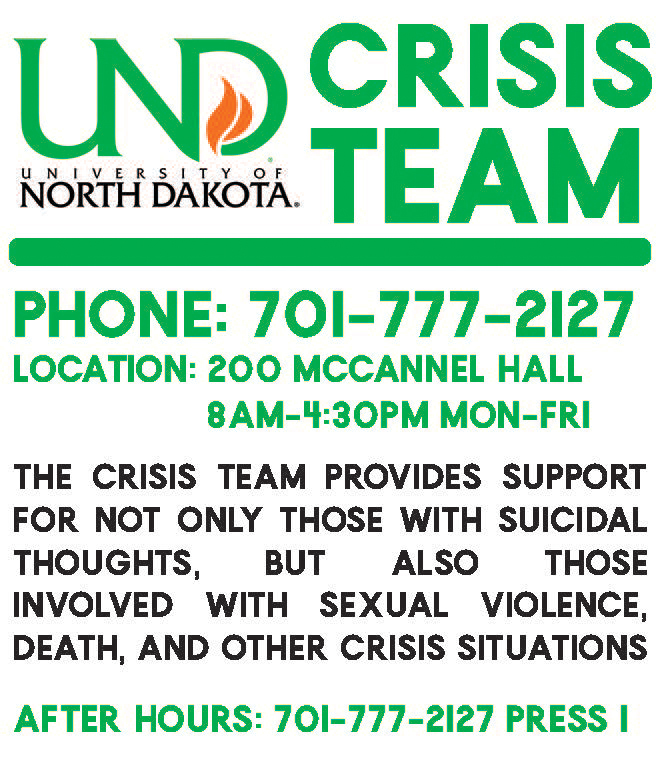Suicide prevention
The importance of mental health in college
September 24, 2017
As college students, we come up against countless challenges. To list the number of challenges a student might encounter during their time at UND is unfathomable. I transferred to UND in the fall semester of 2016. I had taken a few years off of school to travel, gain some work experience and finalize my choice of major. When the semester started, I felt as if I had no idea what I was doing. I was overwhelmed and depressed. My expectations of what my classes were going to be like were ruined and I was spiraling down and I needed help.
I have fought my battles with depression and thoughts of suicide. Those battles became unbearable as I entered college. Thankfully, instead of succumbing to the darkness, I received help through UND Counseling Services. After receiving wonderful support from the Counseling Services, I started reading the staggering amount of research on the mental health of college students; it has occurred to me the “typical college experience” is a gross distortion of reality. Students are not prepared for the rigors of college life, thus falling prey to the oppression of dashed hopes.
Dr. Ken Carlson at the UND Counseling Center (UCC) is collecting research and statistics on suicide and suicide prevention. His research has found that 32.6 percent of students who come to UCC have had thoughts of harming themselves, and/or had thoughts of suicide. This statistic is higher than the national average of 18.2 percent.
I brought Dr. Carlson my thoughts on students not being prepared for college, and having crushed expectations of college life.
Dr. Carlson agreed, explaining that most college students start college with the expectations of performing as they did in high school, only to realize that college is very different. Dr. Carlson also pointed out that many students experience anxiety when they realize that they are potentially in the wrong major. 57 percent of students who come to UCC are experiencing uncertainty with choice of major.
Emory University published research stating suicide as the third leading cause for 15-24 year olds and second leading cause for 25-34 year olds. Bestcolleges.com reports the top five mental health challenges for college students are depression, anxiety, suicide, eating disorders and addiction. 80 percent of students feel overpowered by the crushing weight of their responsibilities and half of those students will not seek help of any kind. Culminates in a 30 percent rise in suicide rates over the past six years for college students.
Thankfully, UCC is here to help students pull through the challenging circumstances they might face. In light of the recent budget cuts, we can hope that the UND administration will remember that the mental health of the students is equally important as their physical health. Universities nationwide are putting their students at risk by not providing adequate mental health services. The Center for Collegiate Mental Health 2016 Annual Report showed only 50.4 of 139 surveyed universities have accredited counseling centers by the International Association of Counseling Services and 30.9 percent have no psychiatric services available.
Despite the rising rate of suicide, the stigma that surrounds mental health is diminishing thanks to open-minded talking and media coverage at the national level. I asked Dr. Carlson if the students of today are different than the students of previous generations. He stated that students of today aren’t different; they are simply choosing to get help. UND’s Counseling Service Center’s doors are open from 8:30 a.m. to 4:30 p.m., Monday through Friday, on the second floor of McCannel Hall. Counseling is a free service to students and anyone can walk in at any time to speak with someone. A person’s mental health is equally important to their physical health. If you need help, do not hesitate to ask. You are not alone.
Aimee Coons is an opinion writer for Dakota Student. She can be reached at [email protected]


